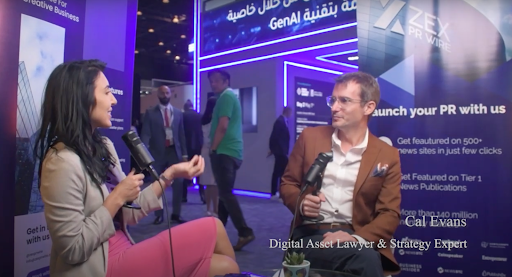Multi-award-winning digital asset lawyer Cal Evans was interviewed at the DIFC Fintech Summit by Henzelene Healley about the differences between the UK and UAE regulatory environments, and the challenges for UK companies to set up shop in the UAE.
See full Interview:
https://youtu.be/DJPHrmcGQEc?si=FWVOCSwynRsoRVZt

Having worked with some of the biggest firms in crypto, NFTs, Metaverse and Web3, Evans describes himself as a not ‘secret tech geek’ owning patented crypto technology and an advocate for crypto and digital asset adoption. “It is a black hole of an industry. Exciting, of course. I mean, I am yet to find a boring black hole, you know. Let us see where this goes,” said Evans.
He added that the DIFC FinTech Summit is a ‘must-attend’ event as it “brings together a lot of really cool people who are both in the DIFC and those trying to find out what it is about.” In terms of the difference between the UAE and the UK, Evans said that the latter is “worryingly starting to shut down.”
The FCA has adopted a heavy hand with regard to digital assets, which Evans added is both a good thing and a bad thing. The FCA currently requires anyone with a presence in the UK to be regulated, whether it is advertising, issuing, or operating. “It makes sense, given the FCA’s typical approach, but there are a lot of caveats.”
In contrast, the UAE is very open, with competition between VARA, the DIFC, and the Free Economic Zones like RAK. “In the UK, you are governed solely by the FCA, whereas in the UAE, you have much more flexibility and choice,” said Evans.
It remains challenging to open a virtual asset company in the UK due to the FCA regulations and application period. “The FCA is unique in its approach. We have had some very interesting responses to our questions and applications. They are doing their job, but sometimes their answers are inconsistent,” noted Evans.
A trend is for clients to relocate from the UK to the UAE, with Evans’ specialising in offshore jurisdictions. “The UAE is fantastic because it is a hub and an ecosystem. However, it is not a one-size-fits-all solution because it is also expensive. Comparatively, Seychelles has no regulation and setting up a company costs around USD1,200. The BVI has some regulation and costs a few thousand dollars. So, while Dubai might not be the answer for everyone, there are plenty of options.”
The UAE requires full regulation of any virtual asset company, which means its corporate structure must link with and legitimize different jurisdictions. Evans said various questions need to be asked in such a case: Where is the business really operating? Where are the founders and decisions made? Different countries normally explain this quite easily because it is usually a taxation issue.
“When we look at a corporate structure, segregating different business operations helps, but regulators are not stupid. If you say you’re an educational arm based in the UAE, they will check if that is true. We advise clients to get regulated properly where they are actually based. The temptation to get a license elsewhere can backfire. If you want to be in the UAE and enjoy everything it offers, get the license there,” advised Evans.
Evans added: “Everyone wants the digital asset space to be taken seriously, but they need to act accordingly. Serious exchanges and token issuers should obtain a license and be transparent. There is a proper way to do things, even for heavy DeFi projects. We must balance working with regulators and ensuring they don’t stifle our clients. Regulators need to work with us too.”
Evans highlighted the Innovation Hub, designed for startups, and with specific licenses for DeFi, access points, and protocols. “It is not cheap, but it offers a robust regulatory framework.” The DIFC offers a DeFi Access Point license for projects that are not purely DeFi but encompass some elements. “It is a great option,” said Evans.
“The DIFC team is very flexible and good to work with. There is a cycle for companies to be licensed and regulated as they grow. We Are now helping some clients move to places like Bermuda, which offers a fantastic regulatory framework for mature companies. Some are even going public. It Is about lifecycle, not just jurisdiction,” concluded Cal Evans.
Interview by Henzelene Heally

Henzelene Healley is a common law qualified lawyer living in Dubai and services clients globally. Healley founded her first legal consultancy in 2019, evolving into The Counsel Services (TCS). She is qualified with an LLB with Honors in New Zealand and was admitted as a Barrister and Solicitor of the High Court of New Zealand in 2014. Healley started her journey in Web3.0/Blockchain and digital assets in 2017 when setting up a crypto exchange in the UAE. In 2021 she was the legal counsel of a crypto mining company in the UAE and a virtual asset VC fund with USD100m in AUM. With over five years of hands-on experience in the startup industry, Henzie and her team of lawyers have played a pivotal role in the growth and success of many companies in the Middle East region by providing legal guidance and support from seed, inception, to series rounds and IPO or exit.



Comments